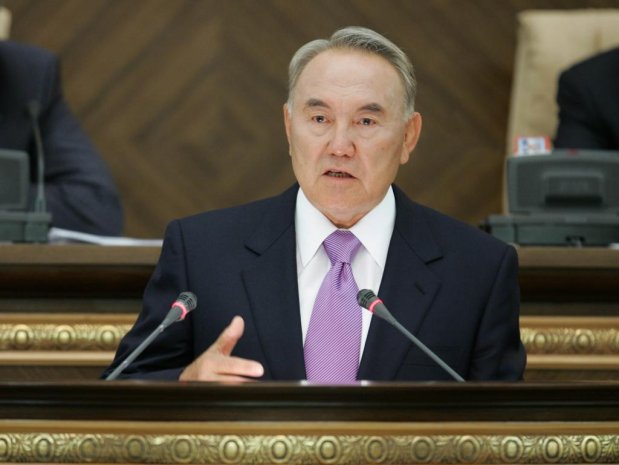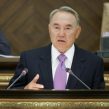
President Nazarbayev Announces Ambitious National Goals in Coming Decades
Publication: Eurasia Daily Monitor Volume: 10 Issue: 5
By:

In his State of the Nation address to the parliament on December 14, 2012, President Nursultan Nazarbayev outlined a new strategy for Kazakhstan’s development through 2050. The document, developed by the government with the help of national and foreign experts, seeks to establish “the vector of long-term sustainable development” of Kazakhstan in the 21st century (https://www.akorda.kz/ru/page/page_poslanie-prezidenta-respubliki-kazakhstan-lidera-natsii-nursultana-nazarbaeva-narodu-kazakhstana).
According to Nazarbayev’s speech, the new strategy is based on the philosophy of “universal economic pragmatism” designed to advance Kazakhstan to the group of the world’s 30 most developed states by 2050. It continues the goals established with “Strategy-2030,” adopted 15 years ago. According to Nazarbayev, Kazakhstan last year became one of the world’s 50 largest economies in terms of national GDP.
The key economic targets for the next 38 years are to define new markets, establish partnerships to promote new sources of economic growth, achieve a favorable climate for foreign investment, promote sustainable private sector business development, make small- and medium-sized enterprises the dominant form of business, develop Kazakhstan’s economic infrastructure, diversify exports beyond oil and gas, promote technological innovation, encourage ecologically responsible policies, develop agriculture and ensure adequate water supplies.
Strategy-2050 also set non-economic goals. It seeks to improve social welfare by establishing minimum standards for health, education, and the quality of life as well as measures to promote gender equality. It specifies the need to counter religious extremism and ethnic tensions as well as promote national unity. Nazarbayev called the “division by clans and tribes […] the most dangerous road in the loss of national unity.” Conversely, he added that there is power “in the unity of the people.”
Nazarbayev reaffirmed the importance of preserving the secular status of the state even while respecting all major world religions. He called on Kazakhs to stick to their religious heritage, which emphasizes tolerance and moderate forms of Islam. Nazarbayev warned against “pulling the country into the Middle Ages” by having women wear the hijab or adopt other foreign practices alien to Kazakhstani traditions. If you tell women, “They cannot drive, cannot move freely, cannot study […] Then how will we educate them?”
In this regard, Nazarbayev stressed the imperative of making Kazakhstanis a “highly educated people” as a prerequisite for reaching all the goals established by the strategy. Appealing to Kazakhstan’s youth as those who had to implement the 2050 goals, the president stated that ”our new course aims to give you new opportunities, better education, decent work and a great future.”
Nazarbayev reaffirmed the importance of raising the status of the Kazakh language, such as by converting to the Latin alphabet by 2025, even while maintaining use of Russian and broadening the use of English. “This will not only promote the Kazakh language,” Nazarbayev said, noting that two-thirds of Kazakhstan’s population was now ethnic Kazakh, “but also [will] transform it into the language of modern information.” At the same time, the president said, it is necessary to make a “breakthrough” in teaching the English language, a means to “open to every citizen of Kazakhstan new boundless opportunities in life” (https://www.akorda.kz/ru/page/page_poslanie-prezidenta-respubliki-kazakhstan-lidera-natsii-nursultana-nazarbaeva-narodu-kazakhstana).
The strategy reaffirms Kazakhstan’s long-standing multi-vector foreign policy and commitment to regional economic integration. The president also cited Kazakhstan’s leading role in countering the proliferation of nuclear weapons and regional terrorism. Finally, the speech called for measures to enhance democracy and the rule of law such as decentralizing political authority from the center to the regions, as well as fighting corruption.
The week following Nazarbayev’s address, Astana hosted an international conference on the “Strategy of Kazakhstan-2050: a promising domestic and foreign agenda.” The forum was organized by the Kazakhstani parliament and included prominent national as well as foreign politicians and experts, including from Bulgaria, Germany, Russia, Turkey and many other countries (www.parlam.kz, December 20, 2012).
People cited in the Kazakhstani media, including those at the conference, offered generally favorable assessments of the Strategy. Many experts and conference attendees welcomed these ambitious goals, noting that they were reasonable given how well Kazakhstan met the previous Strategy-2030. Majilis Deputy Maulen Ashimbayev, commenting on President Nazarbayev’s message, said that moving Kazakhstan into the ranks of the top 30 developed countries by 2050 was “an ambitious goal” but “achievable” (bnews.kz, December 21). Ilya Ilyin, a champion of the XXX Olympic Games in London, said that, “If you want to achieve significant results, we must not be afraid to set goals” (ruse.24.kz, December 14, 2012).
Mayrash Ekibasova, the chairman of the control commission of the ruling Nur Otan Party, welcomed the fact that more than 90 percent of the country’s localities would choose their leaders on the basis of popular elections, calling it “a concrete step in the broader process of further democratization of all branches of power in our country” (bnews.kz, December 14, 2012).
Bauyrzhan Baibek, deputy head of the presidential administration, noted that the Strategy’s stress on accountability would ensure that “every government agency, every government official must provide quality services to the public” and do so “efficiently, transparently and effectively” (ruse.24.kz, December 14).
Moreover, Senior Fellow at the Institute of Philosophy, Political Science and Religious Studies, Dr. Gauhar Barlybaeva, welcomed the national leadership’s long-term planning horizon (vecher.kz, December 14, 2012). Whereas Kuanysh Aytahanov, a member of the Kazakhstani Senate, boasted that, while the 1997 strategy was based on Kazakhstan’s learning from other countries, “now we have become a country that teaches” (khabar.kz, December 22, 2012).
Nevertheless, some Kazakhstani writers offered skepticism regarding the Central Asian republic’s ability to realize the economic goals enshrined in Strategy-2050. For example, commentary in the Kazakhstani edition of Forbes worried about the large role assigned to the state in the new development plan, the limited success of previous efforts to diversify national exports beyond hydrocarbons, as well about the country’s lagging scientific and technological potential (Forbes.kz, January 3).
Still, Kazakhstan’s transformation since its independence in 1992 has indeed been remarkable on several measures. And whether or not the government will be able to fully carry out its ambitious goals, the Kazakhstan of 2050 will almost certainly be unrecognizable to the country it is today.




